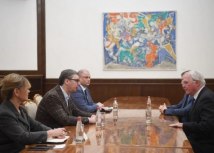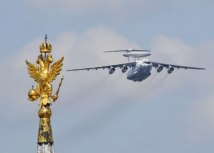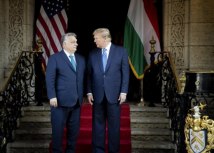Koštunica offers supervised autonomy for Kosovo
Supervised autonomy is the true compromise that eliminates any extreme outcome, the prime minister has said.
Source: B92, Beta"Serbia is ready to make a significant step in finding a good, sustainable solution for Kosovo and Metohija," Koštunica said, explaining the supervised autonomy proposal Serbia came up with.
"The UN Security Council mission, which could see with their own eyes what the real situation in the province is, can count on Serbia to always be ready to start new talks and that the supervised autonomy proposal is the best basis for any future negotiations," Koštunica told the Beta news agency.
"On the one had, Albanians will be able to take their future in their own hands and protect their interests, on the other, Serbia would preserve its sovereignty and territorial integrity according to the UN Charter" Koštunica said.
“Supervised autonomy only solution”
Supervised autonomy concept should serve as basis for the Kosovo status settlement, Belgrade negotiating team members said earlier Sunday.
“The concept of supervised autonomy is a legal basis upon which it is possible to institutionally integrate Kosovo into the legal and political system of Serbia,” advisor to the Serbian prime minister and Belgrade negotiating team coordinator Slobodan Samardžić said Saturday.
In a statement given to the Tanjug news agency, Samardžić explained that the concept of “supervised autonomy” presented to the UN mission by prime minister Vojislav Koštunica on April 26 was "Serbia’s answer to the plan of supervised independence”, the government reported on its website
“The UN mission is now familiar with this concept which will receive far more attention than before,” he said.
Negotiating team member Aleksandar Simić told Tanjug that the concept presented the only solution for the Kosovo issue, as it “respects international law, while at the same time offering ethnic Albanians the opportunity for self-governance, without the influence of authorities in Belgrade and Serbs. “
“The plan envisages that Albanians have all legislative, executive and judicial jurisdiction, with the exception of the areas of foreign policy and defense, customs and border control, monetary policy and protection of Serbian cultural and religious heritage in the province,” Simić explained.
He stressed that their connection with the rest of Serbia would be minimal, and they would have a large degree of autonomy, as well as constitutional guarantees and international legal guarantees in the form of agreements for that type of autonomy.
According to Simić, “the Kosovo Albanians could have representatives in the Serbian Ministry of Foreign Affairs, considering the fact that they would not be able to form and maintain international relations and conclude international agreements.”
He added that they could also have representatives in the National Bank of Serbia, if they wished to participate in some elements of monetary policy running.
Simić said that the idea is to “demilitarize the territory of Kosovo”, implying that there would be “no armed presence in the province, apart from international forces.”
“International forces would be obliged to guarantee peace and security, and a certain period, which may last 20 years, could be used to improve relations between Serbs and Albanians,” Simić concluded.




